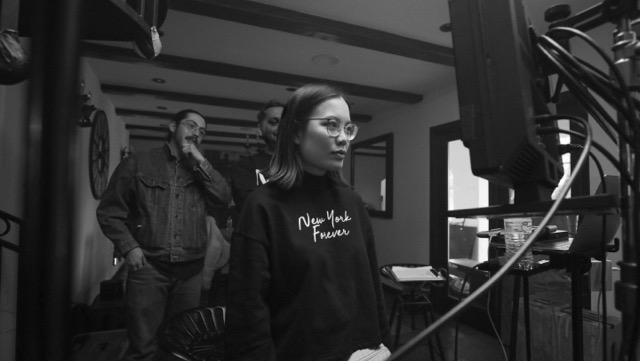God is real…but, how did we get to this place in our existence? That’s the concept presented by the film Paintless and its writer/director Konstantin Pivovar. Seemingly equally inconceivable is the idea of how a production makes this construct accessible and believable to an audience. Pivovar’s masterstroke in achieving this was the enlistment of producer Lilia Le Dieu. For her own part, Le Dieu saw the ability to investigate the notion as both professionally and personally intriguing. She states, “Konstantin wanted to explore the place for artists in such an environment, where there is no more faith or speculation, there’s only a fact – that God exists and has influence over your decisions. As an artist and spiritual person myself, I often question if I have control over my destiny or is my path pre-determined for me. Konstantin sent me the script and I found it unique and heartfelt. It is a beautiful story that can have different interpretations that aren’t wrong or right. Everyone can decide for themselves whether they agree with the character’s decisions.” Released recently, Paintless has garnered awards from the Vienna Indie Short Film Festival in Madrid as well as a “Best Producer” award for Le Dieu at Florida Shorts, San Francisco Indie Short Festival, and the New York Movie Awards. A futuristic story of the legality and reality of God, Paintless has been recognized for the rare and special film it is.

Paintless is a story which centers upon a female painter (played by Anna Greene) who has requested that the church give her approval to commit suicide and meet God. Following the second coming of the messiah, a priest is both the spiritual and legal emissary of the highest law known to mankind. At her interview, a priest (played by Graham Jenkins) pokes holes in the painter’s reasoning for ending it all. The crux of her argument is this, “In a world where everything is known for a fact, is there anything new for an artist to create?” The philosophical meets metaphysical resonation of this idea is profound and fuels the dialogue and action of the film. Undoubtedly a major contribution to the film is the setting of the painter’s home which correlates ideally to the emotional tone of the story. Lilia confirms, “I will never forget the feeling of finding a perfect location and bringing the director, DP, and production designer to see it. As a producer, you spend a lot of time trying to find a perfect location and sometimes this process takes up an endless amount of time. Every decision regarding look and feel stems from location conditions. Location affects all the choices of key members of the production, both creative and behind the scenes, so the process of deciding on shots and sets only starts after the house is locked.”

Lilia notes, “A film is like a baby, and you make it together in a collaborative environment. I’ve had many interviews, meetings, and auditions to find the ideal person for each job.” Among others, the team which Lilia assembled for Paintless included Sound Designer Andrey Dergachev (of the BAFTA and Oscar Nominated Leviathan) and colorist Fernando Torres (well-known for his work on numerous HBO and Netflix productions). The leading duo of Pivovar and Le Dieu are already in the process of creating two more films; “Breadcrumbs” and “Iconic” (Lilia is also working on the comedy feature film Amusement Park for Adults) but she enthusiastically finds herself monitoring the accolades coming in for Paintless. “Steering the ship” of Paintless created an indivisible bond between her and the film. She affirms, “Paintless cannot leave you indifferent. People crave for meaningful stories, the kind that resonate deep to the core rather than only entertain on the surface. There are layers to it. I am excited for people to unfold each level of this film and find something new for themselves to make sense of.”
Writer: Coleman Haan


Be the first to comment on "Producer Lilia Le Dieu Discusses the Metaphysical Sci-Fi Film Paintless"